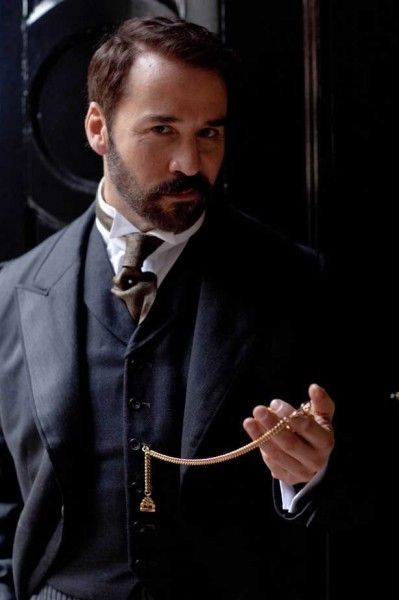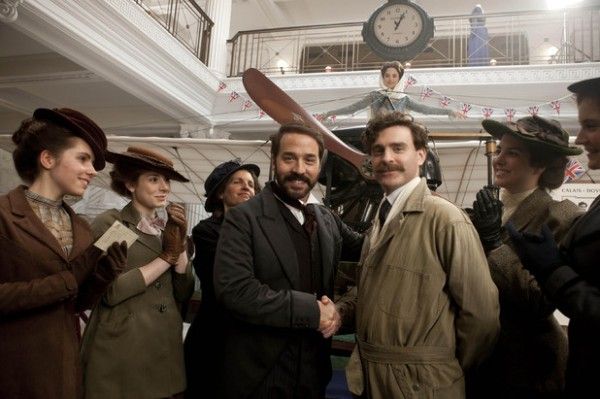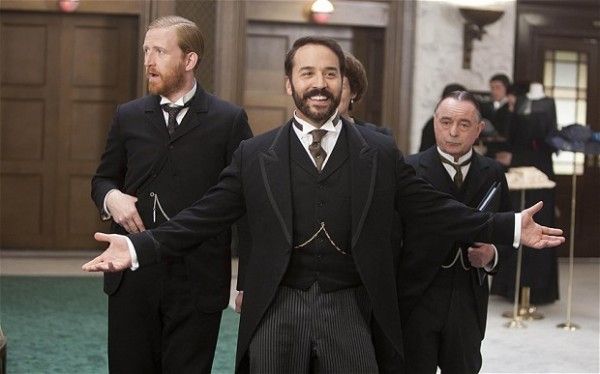Mr. Selfridge, the latest PBS and ITV collaboration, chronicles the exploits of the man who founded the famous high-end Selfridges department store in London, and in doing so, changed our understanding of modern merchandizing. The series ran at the first of the year in the U.K. to mixed, though generally favorable reviews, and having personally consumed the entire ten-episode series in a matter of days I can say unequivocally that it's worth watching. Mr. Selfridge doesn't ask much of its viewers, but it's a sprawling drama adapted by Andrew Davies (who has adapted pretty much every British miniseries you can think of) from a novel, and the series' sumptuous costume designs and whirling stories are greatly entertaining.
Hit the jump for what Mr. Selfridge, starring Jeremy Piven (Entourage) has to offer, and why the women of the series end up stealing the show.
Mr. Selfridge gets compared to Downton Abbey a great deal because it covers roughly the same time period (the early 1900s, though with Downton's time jumps it's entered the 1920s now), but the comparison is not apt. The two feel like they inhabit entirely different worlds. While modernization knocks gently on the door in Julian Fellowes' drama, in Davies' spectacle, modernity is here. Women are riding bicycles to work, couples cavort and have pre-marital sex as part of courting, department stores begin stocking lipstick and rouge and the suffrage movement is in full swing and fully felt in all corners of society.
This is why the women really propel the story forward, because it's their time to begin to find themselves and have the opportunity to do so. Many of the women featured are suffragettes, or support the movement. In fact, most of the women are able to look after themselves and sometimes their families through their wages in Selfridge's store, where they are able to rise to heads of departments and find creative outlets in ways women would never have been allowed in the past.
But what of the man for whom the series is named? Jeremy Piven has been looking to shed his association with his fantastic Ari Gold character from Entourage for some time, but the role suited him so well he hasn't been slotted in anything since that gave the same appeal. As Harry Selfridge though (an American, so thankfully we don't have to suffer through an attempt at an accent), he's able to be just as bombastic as Gold was (without the cursing), being a whirling dervish of a man with voracious appetites for success and for women (though, like Gold, ultimately devoted to his wife … although unlike Gold, that doesn't always manifest itself in monogamy).
Though Piven exhibits the pride and charisma needed for such a figure, he also tends to go overboard with it (especially in the first few episodes), being too grandiose. He stiffly shouts his lines like a community theater actor in a yearly production of A Christmas Carol, without ever quieting down even for more nuanced and natural scenes, especially those with his wife Rose (Frances O'Connor). Most tellingly, there's one episode in which he almost doesn't appear at all, and he's not particularly missed.
The other stories, which follow the employees of the store, are far more engaging. Plot points can sometime be obviously telegraphed, but there are actually a few surprises. In fact, some of the characters or situations that come off as being cliche in the first few episodes end up being subverted as the season goes on. And unlike Downton, characters are neither all good or all bad, but often switch sides and then switch back again, changing up dynamics with each other and the staff at large.
There are a few plots left dangling and a few that are strange (such as a seance that takes place at the suggestion of Sir Arthur Conan Doyle), but overall the show is engaging and fun. The attention to costuming and period details rivals Downton, and the rather educational look at how merchandizing changed (i.e. the idea of sales and putting stock out on display) is fascinating to watch unfold.
Maybe Mr Selfridge's place is just as a nerve-calming balm to the violence of Game of Thrones, or as a lighthearted alternative to Mad Men and other great (though emotionally exhausting) Sunday night fare. But by its own right, and especially for fans of period drama, the beautiful art direction, engaging stories, and (mostly) fine performances definitely make Mr. Selfridge worth a watch.
Mr Selfridge airs Sunday, March 31st at 9pm on PBS





